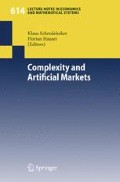Abstract
This chapter explores the methodological issues of modelling human behaviour at the relatively high abstraction level of the differences between individual-based and systems perspectives. Following earlier literature it will be argued that formal frameworks in the social sciences are essentially deductive, as they can be read as implications derived from a set of axioms, or postulates. However, in the social sciences implications derived from postulates do not necessarily have a one-to-one correspondence with empirical observations. This marks an important difference with the natural sciences, highlighted by the possibility in the social sciences of choosing one of several formal frameworks. Therefore, a criterion is needed for judging the explanatory value of a model.
An attractive criterion, based on computer simulations using agent-based models, is the possibility of replicating a stylised version of an observed phenomenon. We argue that parallel to efforts taken in this direction, agent-based methods could also benefit from so-called serious games, where techniques from Artificial Intelligence in computer games are adapted for purposes other than entertainment.
Access this chapter
Tax calculation will be finalised at checkout
Purchases are for personal use only
Preview
Unable to display preview. Download preview PDF.
References
P. W. Anderson and K. J. Arrow, editors. The economy as an evolving complex system. AddisonWesley, Redwood City, CA, 1988.
K. J. Arrow and G. Debreu. Existence of equilibrium for a competitive economy. Econometrica, 22:265-290, 1954.
W. B. Arthur, S. N. Durlauf, and D. A. Lane, editors. The economy as an evolving complex system II. Addison-Wesley, Reading, Mass, 1997.
R. Axelrod. The Evolution of Cooperation. Basic Books, New York, 1984.
R. Axelrod and L. Tesfatsion. A guide for newcomers to agent-based modeling in the social sciences. In Leigh Tesfatsion and Kenneth L. Judd, editors, Handbook of computational economics: agent-based computational economics, volume 2. Elsevier, Amsterdam, 2006. appendix.
L. E. Blume and S. N. Durlauf, editors. The economy as an evolving complex system III. Oxford University Press, Oxford, 2006.
S. Bowles. Microeconomics: behavior, institutions, and evolution. Princeton University Press, Princeton, 2004.
X. Chen and X. Deng. Settling the complexity of 2-player nash-equilibrium. In Proceedings of the 47th Symposium on Foundations of Computer Science. IEEE Press, 2006.
J. S. Coleman. Foundations of Social Theory. Belknap Press of Harvard University Press, Cambridge, MA, 1990.
G. Debreu. Theory of value: an axiomatic analysis of economic equilibrum. Wiley, New York, 1959.
S. N. Durlauf. Statistical mechanics approaches to socioeconomic behavior. In W. B. Arthur, S. N. Durlauf, and D. A. Lane, editors, The Economy as an Evolving Complex System II. AddisonWesley, Reading, Mass, 1997.
J. M. Epstein. Generative Social Science: Studies in Agent-Based Computational Modeling. Princeton University Press, Princeton, 2007.
R. A. Fisher. The genetical theory and natural selection. Clarendon Press, London, 1930.
J. W. Forrester. Industrial Dynamics. Productivity Press, Cambridge, 1961.
H. Gintis. Game Theory Evolving. Princeton University Press, Princeton, 2000.
J. Hofbauer and K. Sigmund. The theory of evolution and dynamical systems: mathematical aspects of selection. Cambridge University Press, Cambridge, 1988.
J. Hofbauer and K. Sigmund. Evolutionary games and population dynamics. Cambridge University Press, Cambridge, 1998.
K. L. Judd. Numerical methods in economics. MIT, Cambridge, MA, 1998.
T. C. Koopmans. Three Essays on the State of Economic Science. McGraw-Hill, New York, 1957.
J. E. Laird, A. Newell, and P. S. Rosenbloom. Soar: An architecture for general intelligence. Artificial Intelligence, 33(1):1-64, 1987.
R. C. Lewontin. Evolution and the theory of games. Journal of Theoretical Biology, 1:382-403, 1961.
N. Luhmann. Soziale Systeme. Suhrkamp, Frankfurt am Main, 1984.
R. M. May. Stability and complexity in model ecosystems. Princeton University Press, Princeton, NJ, 2nd edition, 1974.
J. Maynard Smith. The theory of games and the evolution of animal conflic. Journal of Theoretical Biology, 47:209-221, 1974.
I. Millington. Artificial Intelligence for Games. Elsevier, Amsterdam, 2006.
J.D. Murray. Mathematical biology. Springer, Berlin, 1990. Corrected 2nd print.
J. F. Muth. Rational expectations and the theory of price movements. Econometrica, 29(3):315-335,1961.
J. F. Nash. Non-cooperative Games. PhD thesis, Princeton University, 1950.
A. Newell. Unified theories of cognition. Harvard University Press, Cambridge, MA, 1990.
P. D. Taylor and L. Jonker. Evolutionarily stable strategies and game dynamics. Mathematical Biosciences, 40:145-156, 1978.
F. Vega-Redondo. Economics and the theory of games. Cambridge University Press, Cambridge, 2003.
L. von Bertalanffy. General System Theory: Foundations, Development, and Applications. Pen-guin, London, 1973. (first published in 1968).
J. von Neumann and O. Morgenstern. Theory of Games and Economic Behavior. Princeton University Press, Princeton, 1944.
J. Weibull. Evolutionary Game Theory. MIT Press, Cambridge, MA, 1995.
G. Weiss, editor. Multiagent systems: a modern approach to distributed artificial intelligence. MIT Press, Cambridge, MA, 1999.
M. P. Wellman, A. Greenwald, and P. Stone. Autonomous Bidding Agents. MIT Press, Cambridge, MA, 2007.
N. Wiener. Cybernetics or control and communication in the animal and the machine. MIT Press, Cambridge, MA, 2nd edition, 1965.
M. J. Wooldridge. An introduction to multi-agent systems. Wiley, Chichester, 2002.
H. P. Young. Individual Strategy and Social Structure: An Evolutionary Theory of Institutions. Princeton University Press, Princeton, 1998.
Author information
Authors and Affiliations
Editor information
Editors and Affiliations
Rights and permissions
Copyright information
© 2008 Springer-Verlag Berlin Heidelberg
About this chapter
Cite this chapter
Grevers, W., van der Veen, A. (2008). Serious Games for Economists. In: Schredelseker, K., Hauser, F. (eds) Complexity and Artificial Markets. Lecture Notes in Economics and Mathematical Systems, vol 614. Springer, Berlin, Heidelberg. https://doi.org/10.1007/978-3-540-70556-7_13
Download citation
DOI: https://doi.org/10.1007/978-3-540-70556-7_13
Publisher Name: Springer, Berlin, Heidelberg
Print ISBN: 978-3-540-70553-6
Online ISBN: 978-3-540-70556-7
eBook Packages: Business and EconomicsEconomics and Finance (R0)

